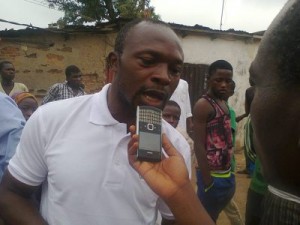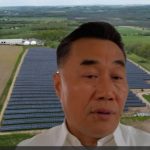 Executive director of GreenAid International, Tabi Joda, is from Northen Nigeria. With GreenAid, an international organization, Tabi Joda wants to involve more women in waste management in Northen Nigeria. Interview
Executive director of GreenAid International, Tabi Joda, is from Northen Nigeria. With GreenAid, an international organization, Tabi Joda wants to involve more women in waste management in Northen Nigeria. Interview
By Houmi Ahamed-Mikidache
01-06-2016
What is GreenAid?
GreenAid is an international organization working toward advancing climate environmental sustainability, globally, based in Nigeria, intervening in grassroot activities that help mitigating climate change.
What is your project about?
GreenAid is working on a project, aiming entirely to utilize waste management, converting plastic waste into waste management, to create recycling companies from plastic waste and to use most of the waste from households to provide organic manners that can be used by farmers instead of taking chemical fertilizers. Chemical fertilizers are not climate friendly. This project by GreenAid is fundamentaly to utilize household’s waste so that women can get engaged in the processing of the waste. GreenAid is intervening in Kaduna State for over 500 women. This is a sustainable livelihood that creates jobs and value for women now.
How do you work with women in Northen Nigeria? Is it difficult?
We are working with women with very many directions. First, there is a challenge in northen Nigeria where women are still having problems of self esteem. They are finding difficulties integrating into the mainstream commercial activities, in governance, development, environment and climate change. We develop self esteem and help them to function as other women and we also sensitize the environmental degradation on the livelihood of women. We sensitize and make them understand how the activities of housewives are linked with environmental degradation.
70 percent of women are housewives in Africa. They use food packages that are plastic. I would say that the large plastic waste come from households and these households are mostly controlled by women. We are engaging women to understand the link with their livelihoods, health challenges, economic challenges and how they can create value as women. Not only as housewives.
Is there any difference between women from the South and from the North of Nigeria?
The cultural backgrounds are different. It determines their lifestyle, the women in the South are more open and they are motivated to get involved in politics ,policy making and shaping opinion in terms of development. There are women living in two worlds apart, for the women in the North, there is a long way to go to integrate into the commercial the mainstream and political activities in Nigeria.
How can you actually make these women work with the threat of Boka Haram?
Women are a key factor in the whole issue of human security in Nigeria. Human security employment, poverty eradication and education are very fundamental in the threat of Boko Haram. Boko Haram is not just a threat to the government, but it is also a threat to individual sustain. That is why we involve women as mitigaters, we empower and train them with vocational skills. We want to stop radicalisation, by informing them.
I have family who died because of Boko Haram. My business activities have been stoped because of Boko Haram. We are living in a society with so many stereotypes about women. You have to tell people what it means to be a social citizen, to be civilized, and changing the mindset of people who are living with stereotypes is not so easy.
This project has a strong dimension in creating a value chain that doesn’t only provide jobs. It is a project that drives the whole issue of climate change conversation, in term of mitigation of waste, and is occupying women by reducing poverty and fighting radicalisation. And I think everyone should be behind this project.




